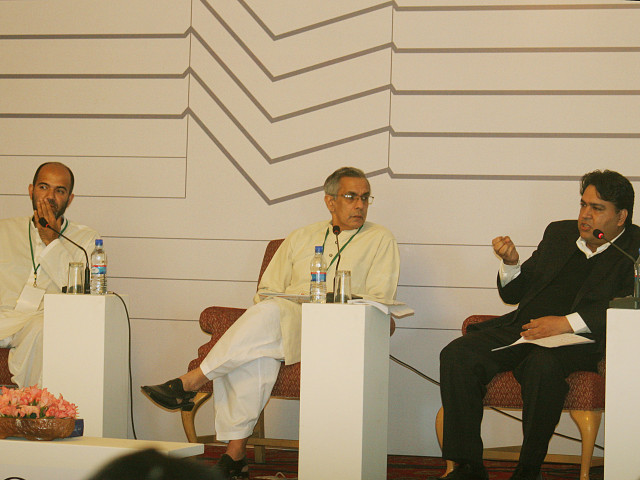KLF: Session on political economy highlights workings of the deep state
Panellists choose to stick to the sociology and politics of Pakistani society.

Panelists discuss Pakistan’s new
political economy during the Karachi Literature Festival on Saturday. PHOTO: EXPRESS
A one-hour session on Saturday on “Pakistan’s new political economy” at the Karachi Literature Festival focused solely on politics rather than its interplay with economics and law.
Besides one passing reference to a survey that put Pakistan among countries that have the smallest voter turnout, there was no mention of any statistical data or empirical evidence during the entire discussion, moderated by economist Akbar Zaidi. Among the panellists were self-described Marxist politician Aasim Sajjad, labour rights lawyer Faisal Siddiqi and Lahore University of Management Sciences’s economics professor Ali Cheema.

Sajjad said that state institutions, like the judiciary, military and bureaucracy, which formed the “steel frame” of society since the pre-Partition era, have now ceased to be cohesive. “People running these institutions used to be educated, westernised, secular and extremely elitist. But from the 1960s onwards, the profile of people joining these institutions has changed,” he said.
Making a sweeping statement, Sajjad asserted that each and every student at the Quaid-e-Azam University – in fact, all government universities of Pakistan, he hastened to add – get a university education only because they want to take the Central Superior Services (CSS) exam.
“State institutions are now run by those who have come from less-privileged, non-urban backgrounds and are not English medium. That’s a big change, but we don’t feel it because the apparent steel frame is still there,” he said.
Although he did not say what exactly he meant by the “middle classes”, Sajjad said their role is getting increasingly important within the ‘political, social and cultural institutions’ of the country. “Politics in Pakistan is not ideology-driven. It is based on patronage. Politics now means letting the people of your ethnic, religious or political constituency have access to the resources of the state,” he said.
Taking part in the discussion, Siddiqi said that the judiciary is basing its power on public legitimacy, which is closely linked to the media. “The media is the prism which constructs the notions of public legitimacy. It determines for the judiciary which issue is important and which isn’t,” he observed.

Cheema said there is an acute local institutional crisis in Pakistan, as their capacity to deliver has decreased to a great extent in the recent past. “Mechanisms to govern, to resolve disputes, and to manage common resources have collapsed. There is no institutional framework of the state that could respond to the increasing degree of contestation and plurality of demands,” Cheema said.
Published in The Express Tribune, February 17th, 2013.
Like Business on Facebook to stay informed and join in the conversation.



















COMMENTS
Comments are moderated and generally will be posted if they are on-topic and not abusive.
For more information, please see our Comments FAQ